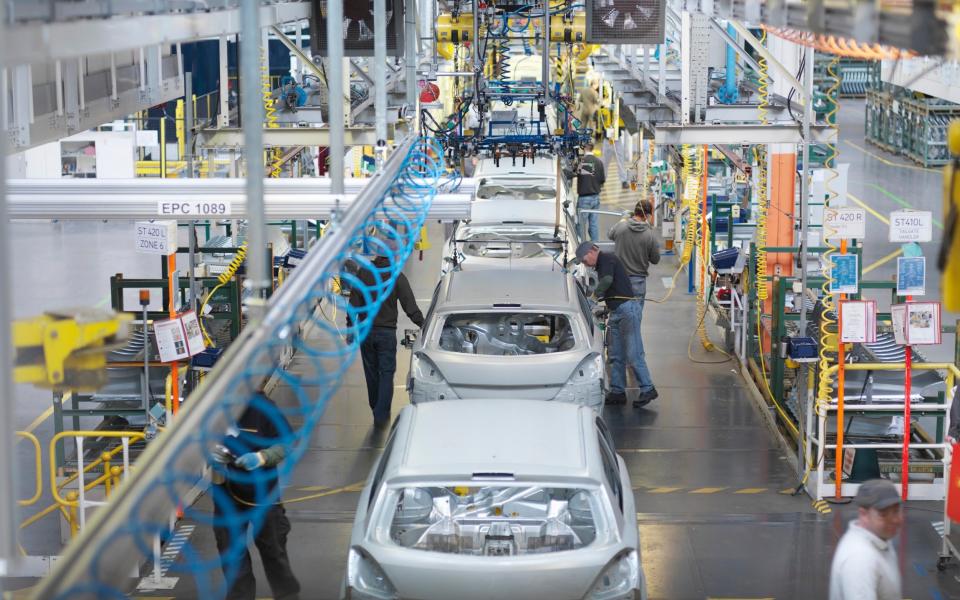Northern Ireland ‘offers backdoor for drivers dodging net zero rules’

Northern Ireland will become a backdoor into Britain for non-electric cars after the UK bans petrol and diesel engines because of Rishi Sunak’s new Brexit deal, Tories and unionists have said.
The UK plans to end the sale of new petrol and diesel cars to hit its net zero climate change target but Brussels has watered down its own ban on polluting internal combustion engines by permitting models that run on a synthetic alternative known as e-fuel.
That decision creates a loophole in Northern Ireland, which follows many European Union rules under the Windsor Framework to prevent a hard Irish border.
The divergence in UK and EU rules, which came about after sustained pressure from the powerful German car industry, is the first to emerge since the Prime Minister struck his new deal with the European Commission last month.
It means drivers could dodge a British government ban on the engines by buying non-UK compliant cars in Northern Ireland and bringing them back across the Irish Sea.
The Government has pledged that trade between Northern Ireland and Britain will be as unfettered as possible, making it easier to transport the vehicles.
David Jones, a former Cabinet minister and ex-chairman of the European Research Group, which opposes the Windsor Framework, said: “Nothing will be done to stop it.
“This is an inevitable consequence of the Northern Ireland Protocol which has been rebadged as the Windsor Framework. It is a backdoor into the mainland UK market."
Lord Dodds, A DUP peer, said, “There will always be new issues thrown up by the UK deciding to diverge from the EU or the EU going off in a different direction from the EU.
“This will always pose questions for Northern Ireland and for the wider implications for Britain as well because the fundamental problems of the Protocol haven’t been resolved, just some of the symptoms.”
The UK wants to ban pure petrol and diesel engines by 2030, while allowing hybrids for another five years. The EU has a similar ban but it focuses on reducing tailpipe emissions, which have to come down to zero between 2030 and 2035.
Industry sources downplayed speculation that this would mean British drivers could buy petrol and diesel cars in the EU and Northern Ireland for five years to avoid the UK ban.
The EU reductions in emissions from 2030 will also rule out pure petrol and diesel engines and only allow for hybrid vehicles to be sold in Europe at the same time as the UK ban takes effect, the sources said.
However, Berlin has won a carve-out from the tailpipe emissions ban for internal combustion engines which run on e-fuels such as those made from hydrogen generated using green energy and carbon dioxide extracted from the air.
EU governments agreed the carve-out for e-fuels after painstaking and divisive talks but attention has now turned to what the change means for Northern Ireland.
The e-fuel compromise is an amendment to an existing regulation. EU officials confirmed this meant it could only be stopped from applying in Northern Ireland through the new Stormont Brake.
The brake, a concession won by Mr Sunak in the new Windsor Framework, can block EU legislation from automatically applying in Northern Ireland if 30 MLAs object to it.
That can only happen if the amendment has a “a significant impact specific to everyday life of communities in Northern Ireland in a way that is liable to persist.”
If the brake is pulled, the Government can prevent the law from applying in Northern Ireland following lengthy discussions with the EU.
However, the Stormont Brake can only be used if the Northern Ireland Assembly is up and running.
As things stand, the DUP has refused to drop its boycott of Stormont over the Protocol and return to power-sharing because they are not satisfied with Mr Sunak’s new Brexit deal.
Lord Dodds said: “Even if Stormont was up and running, the difficulty of the Stormont brake is it is such a convoluted process and such a high bar to reach in the first place that it's difficult to see how it could operate in practice."
Industry sources cast doubt on whether e-fuels would ever be a scalable rival to electric cars, with their use likely to be reserved to expensive supercars or jet planes.
The Electric Vehicle Association of Northern Ireland said: “We would call on the UK government not to water down current plans and instead to accelerate the charging Infrastructure rollout across the UK."
The British car manufacturing industry must ensure its cars meet EU standards if they want to export to the bloc, one of its major export destinations. In 2022, almost 79pc of all cars manufactured in Britain were exported.
A spokesman for the Department for Transport said: “E-fuels are not proven technology, have expensive and complex supply chains, and emit much of the same pollutants as petrol and diesel. They might have a role for specialist vehicles, but we are not looking at them as a solution for normal cars and vans.
“We remain committed to helping people switch to electric vehicles, having invested £2bn so far, ending the sale of new petrol and diesel cars by 2030, and for all new cars and vans to be zero emission by 2035.”

 Yahoo Finance
Yahoo Finance 